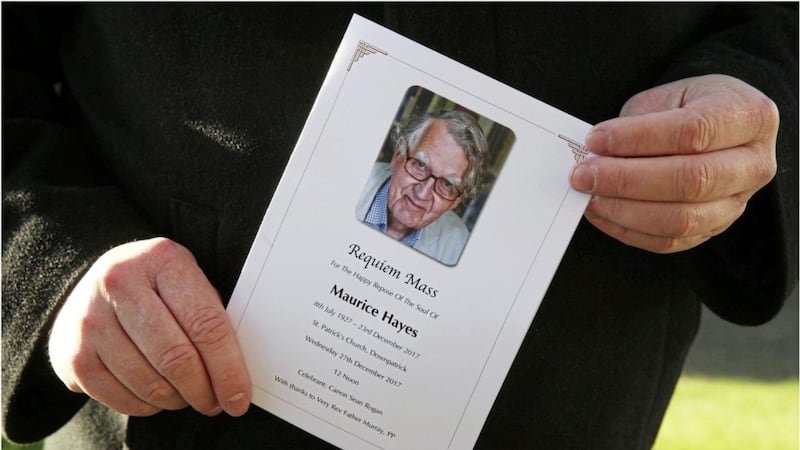WHERE we are going nobody knows but whether that matters a lot or a little is a matter for argument.
About the only certainty is that the loss of Stormont exercises unionists more than nationalists.
But that still leaves unionists mystified as to why it cannot be re-installed in short order, and for the duration of their mystification Stormont will stay silenced.
In this light the death of Maurice Hayes just before Christmas leaves melancholy afterthoughts, although Maurice had not an ounce of melancholy in him.
A networker of contacts and other thinkers, he had sharp insights to offer well into his last year. Where his views might be destined for public consumption he used diplomatic language but a refusal to be pious was one of his most winning qualities.
Watch the interview he did with Eamonn Mallie last April. In his easy, unpretentious Irish he rehearsed the precepts of a lifetime and rated his own achievements; prime among them his family, though he credited Joan, his wife, with their 'deas, macanta' - decent, sincere - children. It was a typically graceful compliment.
He told Mallie he hoped he would be remembered himself as sincere.
He credited one of his fellow Patten commissioners, the Ulster Unionist Peter Smith, with the same quality.
The Patten proposals that helped produce a police service out of an overwhelmingly Protestant state force were recognised by many as having been drafted by Hayes.
The other achievement he singled out was that of John Hume, long-time friend as well as a close associate in the first, short-lived power-sharing Stormont.
Hayes told Mallie that 20 years before it happened Hume had roughed out the shape of the 1998 Agreement. What Hume did was that "he gave leadership, hope - and he showed up".
The Mallie interview was clearly meant to celebrate a life, not to spark assessment of a rueful kind.
So not the time to note that the Police Service of Northern Ireland, as of now and for some time past, cannot maintain a representative quota of Catholic officers, nor tackle loyalist paramilitary crime. Nor that Hume's SDLP is a pale shadow, and that the Good Friday structures if not wholly defunct have a heavy finger on the pause button.
On one of the touchiest issues, that of 'legacy' inquests, Maurice Hayes was at his most crisp.
There should be a line in the sand: "Everything can't be neat and tidy. We can't keep going over it."
The community needed calm on the subject, for a generation or two maybe: "I understand it's very hard for victims but maybe it's the price we have to pay."
A rare harsh note, it was entirely of a piece with the way he conducted his career; get on with it, do what you can, make improvements if possible, then let it be.
The duff notes in politics and society as he bowed out hardly surprised him. But there must have been some dismay.
This was a man who launched himself into unionist-dominated public service from a largely passive and demoralised nationalist minority, and saw both change utterly. Yet look where we are.
Lengthy public service alone would have brought him honour and a warm farewell. He won more than that.
This paper, echoed on a smaller scale in the newspapers of unionism but still respectfully, marked his death as that of a major figure.
BBC NI, which began life as Unionist Stormont's press office, used warm tributes that breathed his GAA history, his Irishness.
Those of us whom flu barred from his funeral peered at the televised turnout to register the missing as well as the many attenders.
Lady Sylvia Hermon showed up, decent and sincere, whose husband's force Maurice helped dismantle.
But present-day Ulster Unionists were not noticeable, nor anyone representative of DUP leader Arlene Foster, a poor show and entirely predictable.
President Michael D. Higgins, clearly glad to be there, did Maurice honour as friend and Irishman. Leo Varadkar sent an aide-de-camp; did Gerry Adams send the Sinn Féin equivalent? Outside their own ornately-tended 'base' the Shinners are still stingy with the decencies. But local, though abstentionist, MP Chris Hazzard was there and paid a generous tribute, though well he must know Maurice's view of abstentionism.
The arc of Maurice Hayes' life was coloured by south Down's constitutional nationalism as by his own Munster and GAA 'hinterland', and his own remarkable drive.
He would say, "Ah, never mind the melancholy." So let us remember instead the smile in those wise eyes.








